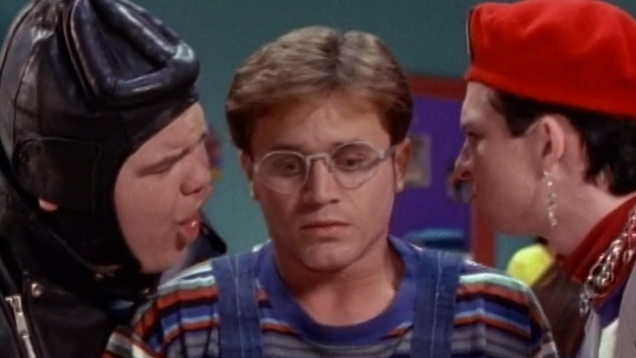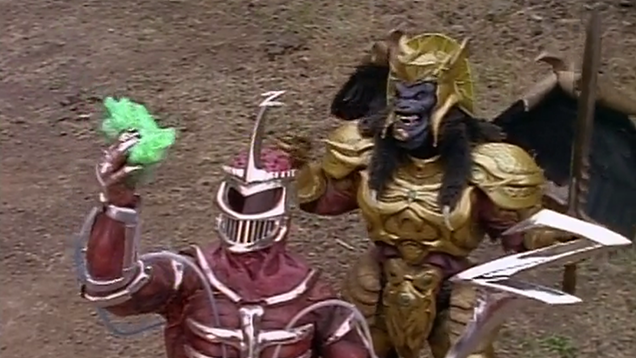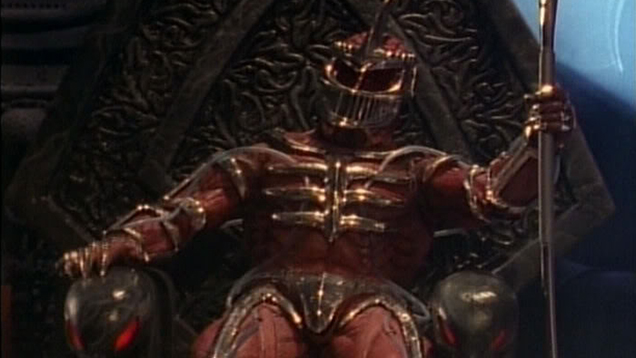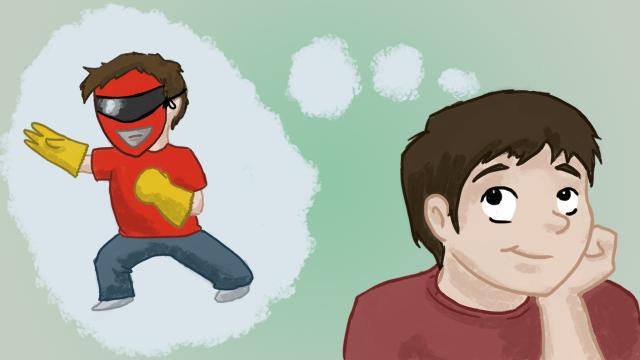Kids shows are pretty cheesy. Power Rangers, doubly so. The idea of learning real, adult life lessons from the shows we loved as kids sounds silly, but sometimes things stick with you. Here’s what the Power Rangers taught me that actually stuck around. Seriously.
Don’t Let Other People Make You Feel Like Crap

Bullying isn’t a new trope for kids shows. In my day, though, there was no one who epitomised the nerdy stereotype more than Billy, the Blue Ranger. His role on the show was to be an egghead, despite the show’s heavy emphasis on solving problems by punching them. In the early episodes, people couldn’t even understand the way he talked. He needed someone else to translate his geek-speak into human words.
Being a nerd came with a lot of self-esteem issues, especially in the 90s, before being “geeky” became cool. The Rangers addressed this often, but it was especially poignant in an episode called Dark Warrior. In this episode, Billy gets bullied by the disgustingly loveable Bulk and Skull (again). Finally, he’s had it. He decides to learn martial arts to defend himself. At the end of the episode, though, he doesn’t use his newfound skills to take down the bullies (Trini’s invisible uncle takes care of that). Instead, he says, “I really just needed to prove to myself that I could do it.” In the end, what he felt about himself was more important than what others felt about him.
This was one of the hardest things to learn once I started writing professionally. Writing for the internet is extremely public. For a long time, I wanted to write, but I was terrified of putting myself out there. Best case scenario, my work would be read by a lot of people, many of whom would probably hate and mock it. Worst case, it wouldn’t get read at all. Neither felt like it would be good for my self-esteem. It would be a lot safer to just do my boring office job and keep my work to myself.
Billy never would have done that, though. Billy wanted to be part of the team, to make himself better and take chances. For a shy, scrawny nerd, he did rather well for himself. As the show went on, Billy became a better fighter and a better communicator. Oh, and he invented all kinds of gadgets the team needed, including their communicators, teleporters and a freaking flying car. Rather than let the opinions of other people push him around, he used his skills to make the team better. Sitting out the fight wasn’t an option.
This lesson took on an even more sombre note when I became an adult and found out why David Yost, the actor who played Billy, eventually left the show. Off screen, David was bullied for his sexuality by producers and other crew members. Knowing that he was bullied off screen just as much as on screen hurt the child in me. At the same time, it made the lesson I learnt from him all the more powerful. Despite the abuse, he stuck around for nearly 200 episodes and a movie. He was the only ranger to appear in every single episode of the Mighty Morphin series, and he was the second-longest running ranger ever. Being pushed around, insulted and mocked never convinced him to stop doing his best work.
You’re Going to Fail, and You Have to Move On

Tragedy and kids shows don’t usually go well together. Every episode ends with the good guys winning and everything going back to normal, because otherwise you have a bunch of crying kids and angry parents. Which is why it was so shocking when the Green Ranger lost his powers in Green No More. Jason, the Red Ranger, was forced to choose between saving the four other rangers, or preserving the Green Ranger’s powers. In the end, he chose the former. The Green Ranger, one of the most popular characters in the show, was gone (for a while, anyway). It shocked kids everywhere.
It was the follow up episode Missing Green, though, that twisted the knife. Jason found himself racked with guilt. In a show where the good guys always win, the team had actually lost something real, and Jason blamed himself. His guilt was so strong that it affected his ability to fight. It wasn’t until the other rangers were kidnapped again, facing the same power-stealing threat the Green Ranger faced in the last episode, that Jason was able to get his head back in the game and fight.
Guilt has this way of messing with your head and undermining any confidence you have. It doesn’t matter if you’ve succeeded fifty times before (which the rangers certainly had by this point). Blow one project, miss one deadline, lose one deal and it will colour how you approach everything you do from then on out. Here’s the thing, though: if you give up when you fail, you never succeed again.
In my (brief) university days, I faced failure on a number of occasions. We often had to rely on a team to get our projects done, which meant that if one person didn’t do their job, the whole team failed. On one occasion, I lost a tape containing some important scenes we’d shot earlier. While it didn’t mean the project was ruined, we did lose some key footage that our team loved. We all agreed it would have blown our teacher away, but without it, we managed a middling grade. Someone else on the team edited around it and saved us in the end.
By the time the next project came along, I wasn’t feeling great. Our teacher used my failure as an object lesson for staying organised and keeping up with your footage. I felt like crap, but it motivated me on the next project. While our finished video wasn’t the best, our notes were never cleaner. Our footage, never more organised.
When I was a kid, being a ranger meant not giving up, even if you fail. In case you couldn’t tell by the hundred different iterations the show spawned, throwing in the towel was not an option. Even years after I stopped watching the show, that never-give-up attitude stuck around.
There’s Always a Bigger Challenge

When you’re a kid, nothing feels bigger than the big baddie of your favourite TV show. For what felt like years (in reality, it was about one year), Rita Repulsa was the worst of the worst. She was relentless. I thought nothing could be more threatening. Then Lord Zedd came along, in the three-part series The Mutiny. We were introduced to the Emperor of Evil as he blew up the status quo with a new fortress, new powers, and a pretty gross inverted costume consisting of exposed muscled and a metal exo-skeleton.
As a kid, it had never occurred to me that the rangers wouldn’t be the ones to finish off Rita. Surely, some day, they would be finished and the good guys would win. Instead, a newer, badder villain showed up, got rid of the old one, and made life for the rangers harder than ever. Sure, even as a kid, I knew it was a TV show, but at the time nothing felt scarier. This was the first time I was ever emotionally invested in something that went from bad to worse.
In a way, this is a perfect allegory for life’s challenges: they never end. Every year there’s a new one. While I stopped watching the show in high school, I still expected each year to bring some new bad guy into my life. Over time, those bad guys changed from goofballs in costumes to simple life goals, like graduating high school, getting an education and finding a job.
This mindset of constant change and new bad guys stuck around even when I entered the job market. I’d always been raised to assume that you get a job with a single company, moved up over the decades, and retired with a nice pension. My grandfather did that with the post office. While my father changed companies a couple times, I never got the impression that being with one company for too long was a bad thing.
This strategy would not work for many industries today. Now, it’s ill-advised to stay with a single company for too long. While some professions might reward long tenures, in most places, you can get more from leaving than from staying. Facing new challenges, bosses and work environments can improve your skill set far more than staying in one office for years on end can.
Approaching my career the same way I anticipated new ranger seasons helped put it in perspective. Every time I changed jobs for a new opportunity, it felt like a new, exciting challenge, rather than losing my old comfortable life. Change made me nervous, but knowing that each new monster (or company) could be just as fun and rewarding as the old one made it that much more exciting to tackle.

Comments